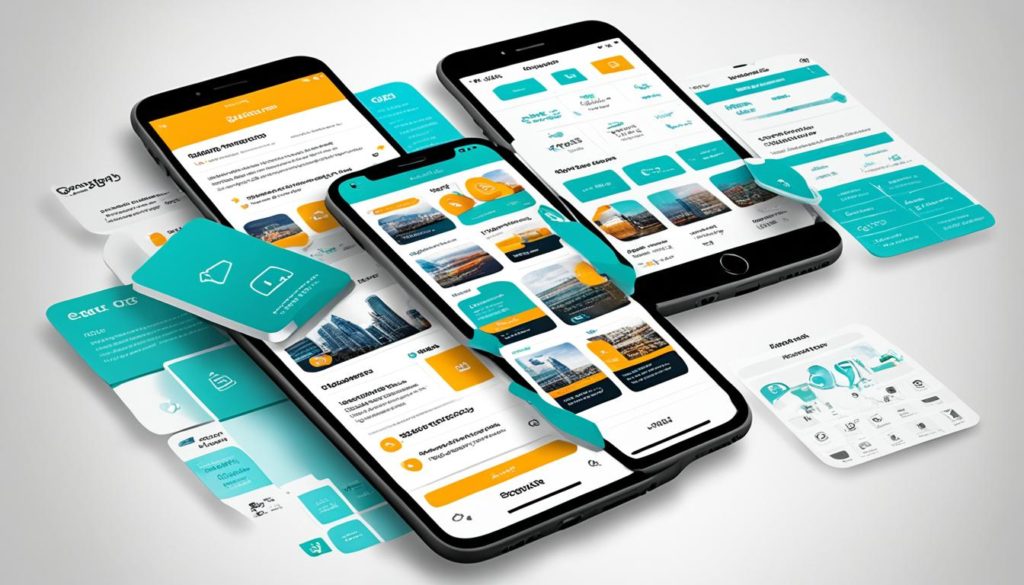
Did you know Kotlin’s latest release in 2023 made it one of the fastest-evolving programming languages? Java, on the other hand, has dominated the industry for more than 20 years. The debate on Java vs Kotlin, especially in Android development, is hot among developers.
We will look at what makes Java and Kotlin different from each other. We will consider performance, productivity, and their features. For example, Java needs semicolons in its code, while Kotlin does not. This makes Kotlin’s code easier to read and write.
Kotlin also focuses on avoiding null errors and offers modern factors like coroutines. It is catching up fast with Java’s reliable community and tested reliability. Java has a big community and a history of reliability. But Kotlin comes with features like coroutines and simpler coding.
The tech world saw a big move when Kotlin became Google’s top pick for Android in 2019. We will give you an overview to help you choose between Java’s solidness or Kotlin’s sleekness. Kotlin saves time as it doesn’t need you to write a lot of common code. Java, though, has features that are great for managing on-going projects.
Key Takeaways
- Kotlin’s newest version, 1.9.22, came out in December 2023, showing its quick growth.
- Kotlin lets you write code more simply and has newer features than Java.
- Java has been leading for over two decades, backed by a huge community.
- Google picked Kotlin as its favorite for Android development in 2019.
- Both languages can work together, allowing Java code in Kotlin projects and the other way around.
Curious about what each language can do? For more on Kotlin vs Java features, check out this in-depth guide. It’ll help you in choosing the right language for your next project.
Introduction to Java and Kotlin
The world of programming languages is vast, and among the myriad options available, Java and Kotlin stand out. Java, a titan with over two decades of dominance in the development industry, is lauded for its robust nature, portability, and cross-platform capabilities. On the other hand, Kotlin has gained traction quickly since its introduction. Both languages are high in flexibility and provide substantial robustness, making them popular among developers worldwide.
Overview of Java
Java, developed by Sun Microsystems in 1991 by James Gosling and colleagues, is a widely popular programming language used in various domains, including web development, mobile app development, desktop applications, and game development. Java’s strengths lie in its object-oriented programming capabilities, which promote reusability and modularity. With a strong emphasis on portability, Java code can run on any machine with a Java Virtual Machine (JVM). This attribute, coupled with an extensive and well-established community, has firmly planted Java as a go-to choice for large enterprises.
Overview of Kotlin
Introduced by JetBrains in 2016, Kotlin is a newer programming language that has quickly become popular, especially in Android development. Kotlin’s concise syntax, type inference, and null safety features are designed to reduce runtime exceptions and boost app performance. Backed by Google, Kotlin has become an official language for Android development, making it a strong and flexible choice for developers. Additionally, Kotlin is cross-platform and fully interoperable with Java, allowing developers to leverage their existing Java code and resources effectively.
Kotlin’s design includes features like lambda expressions, higher-order functions, and extension functions, supporting functional programming paradigms. Its advanced type system and the use of immutable data structures contribute to performance gains and simpler code. These features not only boost the programmer’s productivity but also ensure a safer, more reliable codebase.
For a more detailed comparison between Java and Kotlin, you can refer to these comprehensive resources:
- Difference between Java and Kotlin
- In-depth analysis of Java vs Kotlin
- How to distinguish Java and Kotlin
Key Features and Syntax
Choosing between Java and Kotlin depends on understanding their key features. Java has a strong feature set and familiar rules for experienced programmers. Kotlin introduces modern elements to minimize unnecessary code and boost productivity.
Java Features
Java stands out for being stable and reliable. It manages memory safely and handles errors carefully, including common NullPointerExceptions. Its use of explicit syntax like semicolons and typecasting is great for seasoned developers.
Its independence across platforms, large libraries, and strong support community make Java a top pick for big projects.
Kotlin Features
Kotlin makes code cleaner by not needing extra semicolons. It offers smart casting to improve code safety. Its features like data classes cut down on repetitive code, speeding up development.
Kotlin focuses on avoiding null errors and works well with Java code. This has quickly made it popular for modern app building.
| Feature | Java | Kotlin |
|---|---|---|
| Memory Management | Static | Static and more optimized with smart casting |
| Error Handling | NullPointerExceptions | Null safety features |
| Syntax | Explicit semicolons and typecasting | Omission of semicolons, smart casts |
| Boilerplate Reduction | Minimal | Data classes, type-safe builders |
| Legacy Integration | Established ecosystem | Seamless Java interoperability |
Java and Kotlin both shine in their ways. Java has a proven infrastructure. Meanwhile, Kotlin’s syntax and features enhance modern development practices.
Java vs Kotlin: Performance and Productivity
When comparing Java to Kotlin, we often look at their performance comparison. Java is known for being fast and reliable, making it a solid choice for many apps. Kotlin, however, aims at modern challenges by focusing on shorter code. This boosts both its performance and productivity.
Performance Comparison
Java and Kotlin both run on the Java Virtual Machine (JVM), so their performance is similar. What makes Kotlin stand out is its efficiency. It has light features that keep Java’s strength without adding bulk. This means you can enjoy Java’s dependable performance while also getting Kotlin’s easier approach.
Code Conciseness and Readability
Kotlin shines with its code readability. Thanks to tools like data classes and type inference, it cuts down on needless code. This makes coding faster, reduces mistakes, and helps developers create easy-to-maintain code. With these advantages, Kotlin is great for tackling complex projects efficiently.
| Aspect | Java | Kotlin |
|---|---|---|
| Performance | Reliable, swift execution on JVM | Similar performance on JVM, lightweight constructs |
| Code Readability | Extensive boilerplate code | Concise, expressive code with data classes |
| Development Productivity | Needs more code, higher chance of errors | Better productivity, fewer errors with concise syntax |
In conclusion, Java and Kotlin show notable differences in code readability and development productivity. Java is reliable and strong. But Kotlin’s short, modern code gives it an advantage in today’s fast development world.
Differences in Development Experience
Java’s development experience is rich due to its massive ecosystem, great tools, and strong community support. There’s a lot of good documentation and help from the community. This makes learning Java easier because it’s been around for a long time.
Kotlin, however, offers something new for developers. It addresses current programming needs with its advanced features. With support from JetBrains and Google support, Kotlin stands out. Its modern tools, like Jetpack Compose, improve coding by making it clearer and safer.
| Aspect | Java | Kotlin |
|---|---|---|
| Community Support | Extensive and well-established | Growing rapidly with active involvement from JetBrains |
| Development Tools | Mature ecosystems with solid documentation | Modern tools integration, supported by Google |
| Language Features | Stable and familiar options | Advanced and modern, emphasizing safety and conciseness |
With Google support pushing Kotlin as the top choice for Android development, coders find more joy in their work. Kotlin shines with its clear syntax, focus on safety, and easy collaboration. Yet, Java still holds as a strong and familiar choice.
Conclusion
Java and Kotlin are both great for different development needs, each offering unique benefits. Java is an old favorite, known for its reliability and wide use in big companies. It’s especially popular in schools and for building websites, being used 70% of the time. Kotlin, however, is making a name for itself in creating Android apps, thanks to Google’s backing and its new and efficient features.
Picking between these two depends on what you’re looking to do. If your aim is enterprise-level applications, choose Java for its rich libraries and stability. For startups, Kotlin’s simple code and quick processes are better. It’s also becoming a go-to for mobile and web projects, showing its versatility. The differences between them are outlined in the comparison of Kotlin vs Java.
Choosing the best language requires looking at what your project needs. Java is solid and has tons of resources. Kotlin is user-friendly with modern perks like safety from null errors and easier code routines. By considering these details, developers will find the language that suits their project best, leading to successful development and strong results.
FAQ
What are the main differences between Java and Kotlin?
Java and Kotlin differ in syntax, features, and development feel. Java requires more explicit semicolons and typecasting. Kotlin, however, has a cleaner syntax with smart casts and safety from null errors. Java is notable for its long history and broad usability. Kotlin focuses on being up-to-date, aiming to cut down on unnecessary code.
Which language is better for Android development?
Google picks Kotlin as the go-to for Android apps. It blends modernity with ease of use. This combo helps developers work more efficiently. Making app building smoother overall.
How do Java and Kotlin compare in terms of performance?
Both use the Java Virtual Machine, offering similar speed. Java is dependable in its execution. Kotlin stands out by making code less complex. This simplicity can speed up work and lower the chance of mistakes.
What are the key features of Java?
Java is known for static memory handling and solid error management. It sticks with the familiar use of semicolons and typecasting. It’s a good fit for those used to such a environment.
What are the key features of Kotlin?
Kotlin boasts a syntax that skips semicolons and uses smart casts. It aims to minimize overly wordy code. This language is modern, making it suitable for today’s development projects.
How does the development experience differ between Java and Kotlin?
Java has a well-established ecosystem. It provides plenty of tools and community support. This means resources and documentation are plentiful. Kotlin offers an innovative experience with modern features. It’s supported by JetBrains and Google. They include it with new tools like Jetpack Compose.
What are the benefits of using Kotlin over Java?
Kotlin allows for clearer and more compact code. It comes with up-to-date features. These include data classes and the ability to guess types. Kotlin boosts productivity. Plus, it works perfectly with Java. This makes app development smoother.
How does community support differ for Java and Kotlin?
Java’s community is large and well-established, offering many resources. Kotlin’s community, though newer, is also strong. It benefits from backing by JetBrains and Google. It’s quickly building a network full of useful resources.
Is Kotlin suitable for all types of development?
Kotlin shines in Android development, thanks to Google’s backing. It’s also great for server-side and web projects. The right language, though, depends on the project’s specific needs and what code already exists.
Future App Studios is an award-winning software development & outsourcing company. Our team of experts is ready to craft the solution your company needs.










